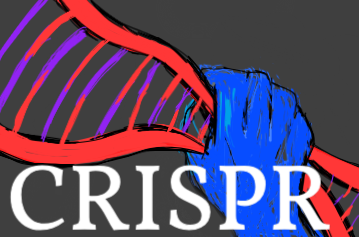The not so near future of gene editing
News broke Monday, November 26th as scientist He Jiankui has supposedly violated doctrines passed by the UN. Two twins in China, named Lulu and Nana, were born a few weeks ago as IVF babies, or In vitro fertilization. However, gene editing technology known as CRISPR was used during the IVF process to help “remove the doorway in which HIV enters to infect people.” Jiankui is currently under investigation by an ethics committee regarding the DNA-editing experiment.
Specifically, CRISPR is a specialized stretch of DNA which has the capability to quite literally act as a pair of scissors to a sequence of DNA and edit it. Previously, CRISPR was a protein secreted by bacteria to destroy other bacterial DNA, which has started to be used to modify DNA rather than destroy it.
Jiankui defends himself by saying he did not edit the genes to heighten IQ, or a “designer baby,” just to make it so that they “will not suffer from a genetic disease which medicine can now prevent.” He gave his testimonial opinion to the associated press during the International Summit on Human Genome Editing. However, He is facing criticism from the scientific community for failing to provide many such key details during his trials of gene editing. A bombshell was also dropped when Jiankui announced there was another woman currently going through pregnancy with a gene edited embryo. Now statistics and facts aside, this poses a question to morality and ethics.
As of December 4th, He Jiankui has been labeled as missing in a report by The South China Morning Post and his whereabouts are unknown.
Many in the scientific community have given their outrage towards Jiankui, and his use of CRISPR technology to modify embryos, whether his intentions were pure or not. Should genome editing be allowed if it gives benefits as He has provided to Lulu and Nana? Now whether or not we shouldn’t use genome editing because it interferes with natural evolution is a subject for another time. However, what is prominent now is the ethical question of whether or not modifying DNA to prevent certain genetic diseases, or to protect against other chronic illnesses. Now, the United Nations view on the subject is more so broad but adamant about not allowing any gene modification; specifically according to the meeting on this March 8, 2005.
After going to an international conference on genome editing in Hong Kong, many figures had called for an international consensus on setting limits to future genome editing of embryos. Specifically, the one who petitioned the ideas was Dr. Francis S Collins, saying this before proposing the international consensus: “It is profoundly unfortunate that the first apparent application of this powerful technique to the human germline has been carried out so irresponsibly.”
“[The General Assembly] this morning adopted the United Nations Declaration on Human Cloning, by which the Member States were called on to adopt all measures necessary to prohibit all forms of human cloning inasmuch as they are incompatible with human dignity and the protection of human life. “ From the UN plenary in 2005.
Now reverting to morals, should a baby be modified before their birth to prevent horrible afflictions such as genetic diseases or chronic diseases caused by foreign bacteria that are preventable with CRISPR editing techniques?
Personally, things such as this are a good thing; however, the only downside to making it legal to start gene editing, or keeping it illegal is that people do them anyways. A great example of this would be prohibition. From 1920-1933 alcoholic beverages were banned; whether you are transporting it, making it, buying it or selling it. During the era, crime rates skyrocketed because common mobsters could profiteer off of the sale of alcohol due to being illegal.
Now, I’m not saying because it will be made legal, that people with bad intentions would take advantage of the situation; especially because not many people do it right now while it is condemned either way, but the potential is there. Is it more likely to turn out almost like the era of prohibition? No, not necessarily but there’s no guarantee that unethical experimentation or adaptations will be practiced by governments or third-party companies. However, the concern is corporations either forming because of, or going into the genome editing market; capitalization of things beneficial in any way is more prevalent due to the immense benefits to the children themselves, as well as corporate giants if the issue is not handled properly. But then again, only time will tell.

Esther is a senior and this is her first year doing graphic for news paper. She is also part of the swim and water polo team. On her free time, Esther...



Chroma • Dec 27, 2018 at 11:19 pm
Yo, this is the main thing I’ve always had a problem with when it comes to ethics in science, at least in regards to humans. The best way to actually research something like this would involve experiments such as these, but the scientific community as a whole is far too bogged down by ethical concerns. While ethics certainly has its place, to slow down scientific progress when there has not even been any demonstrated harm is to have a viewpoint blinded to the greater picture. Science on the grand scale is a collaborative effort across generations, where the individuals involved are of little consequence, yet so many would rather we reduce any potential risk to those being tested on.
Yang Lin • Dec 13, 2018 at 8:02 am
Don’t forget that he used CRISPR on germ line cells so that if there were any mutations, it would be passed down into another generation.
hmmm • Dec 13, 2018 at 7:50 am
I sort of believe that we have a responsibility to make sure people “will not suffer from a genetic disease which medicine can now prevent.” But it might be different in this case as it appears that there is a lack of scientific details. I don’t think there is any problem with the gene editing itself (I don’t think there is a “slippery slope” to designer babies (if that’s even a bad thing)), but rather bad science. Also, if they now made the embryo resistant to HIV, will they be experimented on? Then again, perhaps the rights of a few is outweighed by the needs of the many, such as science — but given that “It is profoundly unfortunate that the first apparent application of this powerful technique to the human germline has been carried out so irresponsibly” it sounds like they aren’t performing very good science.
wut am i doing